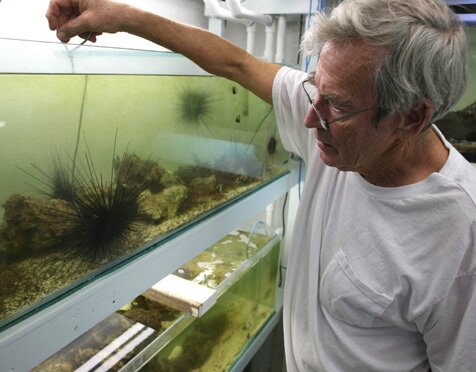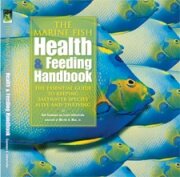A Sense of Caring for the Lives of Marine Fishes
From Microcosm Aquarium Explorer
From reef to aquarium, finding success by doing things right
By Martin A. Moe, Jr.
Foreword to: The Marine Fish Health and Feeding Handbook
The success and the future of the marine aquarium hobby depend on four very different groups of people.
A successful collector of wild fishes is a steward of the reef environment and caring harvester of healthy marine specimens. A successful wholesaler eliminates diseased and drugged specimens, educates collectors, discourages trade in organisms not suitable for home aquariums, and knows how to properly ship all kinds of marine organisms all over the world. A successful retailer keeps a clean, disease-free shop, has healthy, well-nourished fish and invertebrates, can knowledgeably service the needs of beginning and advanced aquarists, and educates customers about the function of systems and the needs of all types of marine organisms.
Finally, a successful amateur aquarist, the core and focus of the marine aquarium hobby, is one who understands how aquarium systems work and expends the effort to properly care for the animals that he or she maintains. The common threads that run through the efforts of all these successful professionals and hobbyists are great respect, appreciation, caring, and proper maintenance of the animals that give us enjoyment, satisfaction, and delight, and perhaps a livelihood as well. But all the love, care, and respect in the world will not counteract a lack of basic knowledge about keeping fishes healthy in a captive environment.
Call the Fish Vet? Not Likely
Do you have a medicine cabinet? Sure you do. It probably contains aspirin, band-aids, antibiotic ointments, and perhaps some prescription drugs. Do you know how to use them? Of course you do. You have learned what each of these is used for, how much to use and when, and when it is no longer useful. You wouldn't just take some medication and hope for a good outcome; you want to know that you are doing the right thing. And you do the same for Rex and Felix, your dog and cat. You have the right food for them, you have medications for fleas and ticks and internal parasites, and the veterinarian is only a phone call away if the situation is more serious. But what do you do for the fish and invertebrates in your aquarium? Unfortunately, nutritional, environmental, and medical care for our marine friends often depends on a hope-this-works, shotgun approach, and the cure can be worse than the malady.
Rex, Felix, you, and the kids all have something in common: all are terrestrial vertebrates, and at an early age we become familiar with the requirements for the health and well-being of these organisms. But aquatic marine organisms — fish and invertebrates — are another story. If something isn't right, if they show signs of disease or distress, you first have to know what is wrong, and then you have to know how to fix the problem, and this isnít always easy. Your local aquarium shop may help, but if not, there aren't many veterinarians on call for sick fish or shrimp, and information on the Web can be confusing and conflicting.
But suppose you could sit down with two guys — one a long-time, extensively published marine hobbyist and the other a professional aquarist with broad experience in the operation of marine aquarium shops and the development and maintenance of commercial marine systems — and ask them how to care for your aquatic animals from birth to old age and how to identify and cure disease? In a way, this book allows you to do just that.
Routine & Emergency Care
Bob Goemans and Lance Ichinotsubo have combined their considerable knowledge and experience in the world of marine aquaristics to write a book about the care and maintenance of marine fishes in home aquarium systems.
The result is a comprehensive instruction manual for the acquisition and routine and emergency care of your aquatic family. Not only do Goemans and Ichinotsubo know what they are talking about, they also care deeply about the marine animals that are the essence of our hobby. It is much more than just a business to them. The success of everyone who makes keeping marine organisms a hobby or a business depends on this level of caring and commitment.
Wholesalers and collectors will benefit greatly from the information in this book, but the retailer and the hobbyist, the people on the receiving end of the chain that stretches from the reef to the aquarium, are the book's main focus. For them, having access to the authors' expertise could mean the difference between success and failure. It is likely this book will become the most valuable item in the marine aquarist's medicine cabinet.
Martin A. Moe, Jr.
Islamorada, Florida
Martin A. Moe, Jr. is the author of The Marine Aquarium Handbook: Beginner to Breeder, The Marine Aquarium Reference Book: Systems and Invertebrates, and other titles.










